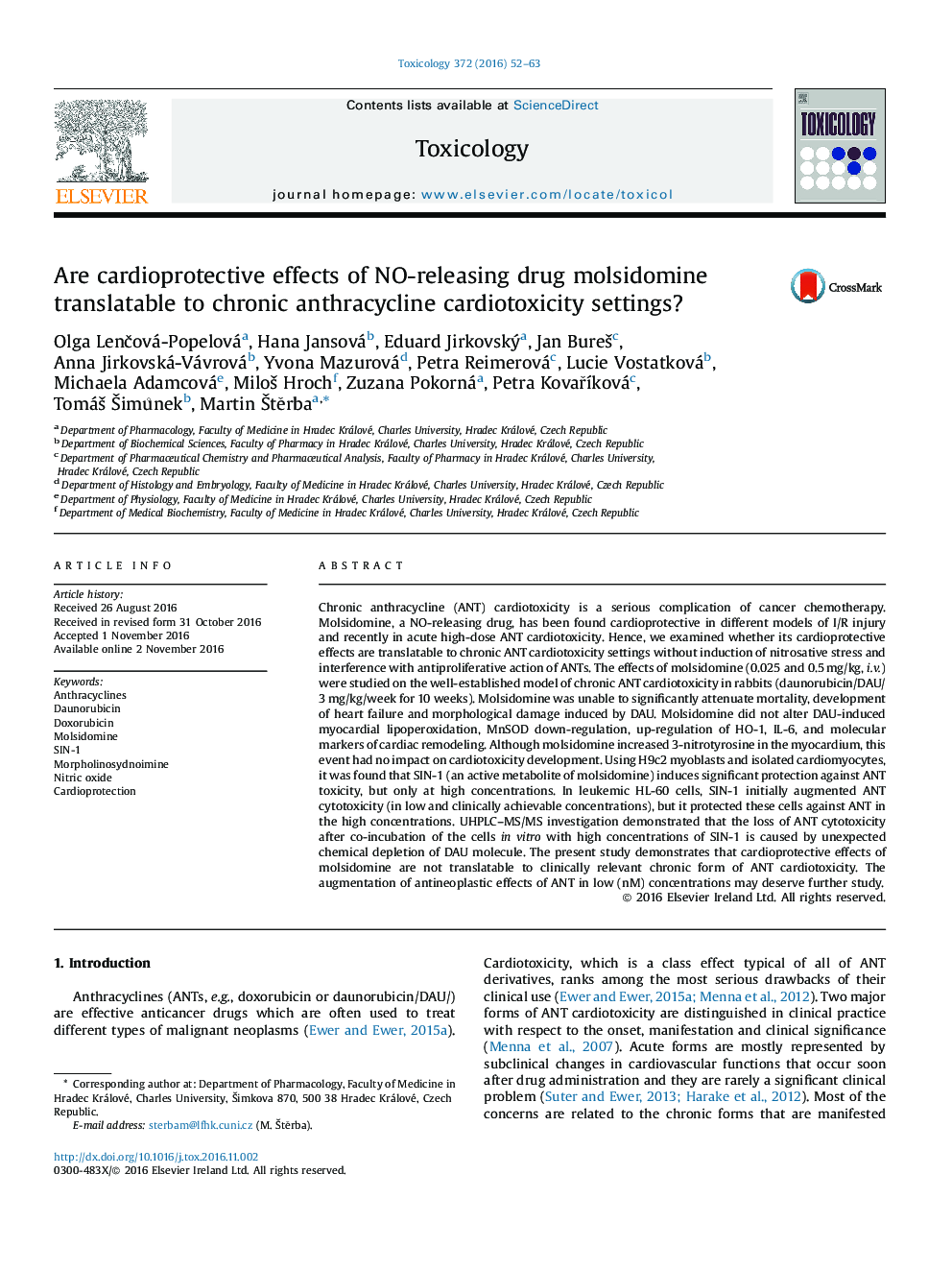| کد مقاله | کد نشریه | سال انتشار | مقاله انگلیسی | نسخه تمام متن |
|---|---|---|---|---|
| 5561933 | 1562300 | 2016 | 12 صفحه PDF | دانلود رایگان |
عنوان انگلیسی مقاله ISI
Are cardioprotective effects of NO-releasing drug molsidomine translatable to chronic anthracycline cardiotoxicity settings?
دانلود مقاله + سفارش ترجمه
دانلود مقاله ISI انگلیسی
رایگان برای ایرانیان
کلمات کلیدی
موضوعات مرتبط
علوم زیستی و بیوفناوری
علوم محیط زیست
بهداشت، سم شناسی و جهش زایی
پیش نمایش صفحه اول مقاله

چکیده انگلیسی
Chronic anthracycline (ANT) cardiotoxicity is a serious complication of cancer chemotherapy. Molsidomine, a NO-releasing drug, has been found cardioprotective in different models of I/R injury and recently in acute high-dose ANT cardiotoxicity. Hence, we examined whether its cardioprotective effects are translatable to chronic ANT cardiotoxicity settings without induction of nitrosative stress and interference with antiproliferative action of ANTs. The effects of molsidomine (0.025 and 0.5Â mg/kg, i.v.) were studied on the well-established model of chronic ANT cardiotoxicity in rabbits (daunorubicin/DAU/3Â mg/kg/week for 10 weeks). Molsidomine was unable to significantly attenuate mortality, development of heart failure and morphological damage induced by DAU. Molsidomine did not alter DAU-induced myocardial lipoperoxidation, MnSOD down-regulation, up-regulation of HO-1, IL-6, and molecular markers of cardiac remodeling. Although molsidomine increased 3-nitrotyrosine in the myocardium, this event had no impact on cardiotoxicity development. Using H9c2 myoblasts and isolated cardiomyocytes, it was found that SIN-1 (an active metabolite of molsidomine) induces significant protection against ANT toxicity, but only at high concentrations. In leukemic HL-60 cells, SIN-1 initially augmented ANT cytotoxicity (in low and clinically achievable concentrations), but it protected these cells against ANT in the high concentrations. UHPLC-MS/MS investigation demonstrated that the loss of ANT cytotoxicity after co-incubation of the cells in vitro with high concentrations of SIN-1 is caused by unexpected chemical depletion of DAU molecule. The present study demonstrates that cardioprotective effects of molsidomine are not translatable to clinically relevant chronic form of ANT cardiotoxicity. The augmentation of antineoplastic effects of ANT in low (nM) concentrations may deserve further study.
ناشر
Database: Elsevier - ScienceDirect (ساینس دایرکت)
Journal: Toxicology - Volume 372, 30 November 2016, Pages 52-63
Journal: Toxicology - Volume 372, 30 November 2016, Pages 52-63
نویسندگان
Olga LenÄová-Popelová, Hana Jansová, Eduard Jirkovský, Jan BureÅ¡, Anna Jirkovská-Vávrová, Yvona Mazurová, Petra Reimerová, Lucie Vostatková, Michaela Adamcová, MiloÅ¡ Hroch, Zuzana Pokorná, Petra KovaÅÃková, TomáÅ¡ Å imůnek,